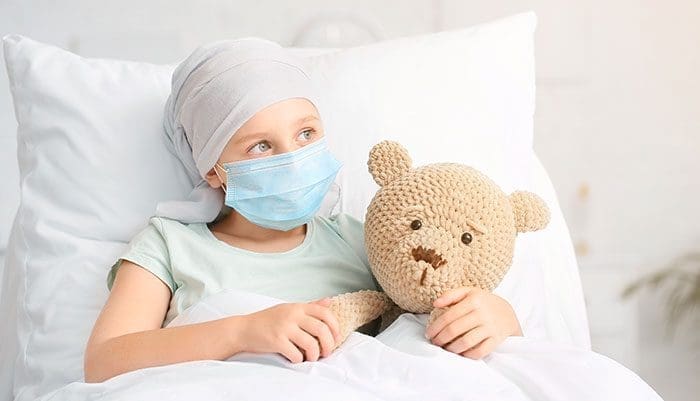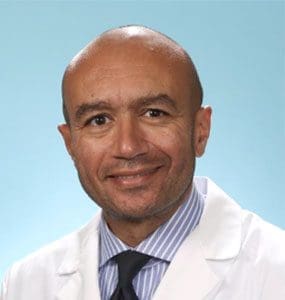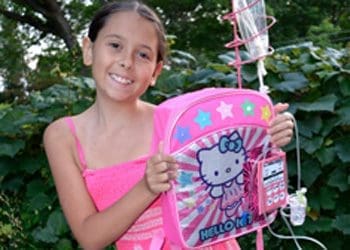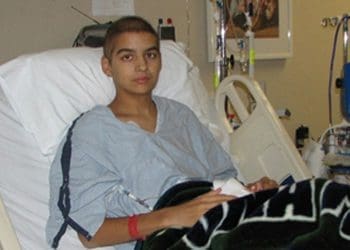Today, we’re announcing $2M in funding for a new pediatric brain cancer clinical trial. Dr. Mohamed Abdelbaki’s team is testing a new type of cancer immunotherapy in children with recurrent brain tumors, with funding from a CureSearch Catapult Award.
August 14, 2024 | St. Louis, MO – CureSearch for Children’s Cancer announced today that it will award $2 million in funding to support a Phase I clinical trial in 24 children and young adults with recurrent brain tumors, a diagnosis with a devastating prognosis. More than 15,000 children are diagnosed with cancer each year in the U.S. and are in desperate need of tailored treatment options.

Dr. Mohamed Abdelbaki is leading the Phase 1 clinical trial at Washington University School of Medicine in St. Louis. The trial will test a promising type of immunotherapy using Natural Killer (NK) cells, a type of immune cell that can recognize and kill cancer cells while sparing healthy cells.
In the past, widespread use of NK cell therapy has been limited in part because it is difficult to produce large numbers of pure NK cells from healthy donors. Dr. Abdelbaki and his team have developed a new method of producing NK cells in large amounts from healthy individuals.
Additionally, cancer cells have been able to escape being killed by NK cells through the production of a molecule, called TGF-β, which suppresses the immune system and helps cancer cells spread. By engineering NK cells to be resistant to this molecule, the team has developed a therapy with enhanced function that can more effectively attack brain tumors. They have also modified the production process by growing and expanding these cells in the presence of TGFβ, enhancing their function by making them resistant to the suppressive effects of TGFβ already in the body.
In this clinical trial, 24 children and young adults with recurring brain tumors will receive these superior NK cells injected directly into the tumor cavity after the tumor has been surgically removed. This approach is designed to help the NK cells target the cancer more effectively by concentrating them at the tumor site. The researchers will also monitor how long the NK cells stay active in the brain and how this affects the overall treatment outcome. This trial, conducted through the Pacific Pediatric Neuro-Oncology Consortium (PNOC), is the first major study to test this approach across multiple institutions in children and young adults with recurrent brain tumors.

“I express my heartfelt appreciation to CureSearch for awarding me one of the most prestigious grants in the realm of pediatric cancer research. This remarkable opportunity will support the first consortium-wide clinical trial for Natural Killer cells in malignant brain tumors, which has the potential to profoundly impact the lives of countless children and young adults,” said Dr. Abdelbaki.
Dr. Abdelbaki is an Associate Professor of Pediatrics at Washington University School of Medicine in St. Louis, Missouri. He also serves as the Director of both the Pediatric Neuro-Oncology Program and the Clinical Research Office (CRO) for the Pediatric Hematology, Oncology and Bone Marrow Transplant Division at St. Louis Children’s Hospital.
The trial is being funded through a CureSearch Catapult Award, which supports Phase I or Phase II clinical trials that advance promising therapies for pediatric cancer. The CureSearch Catapult Award propels high-potential research out of the lab, into the clinic and, ultimately, to the kids who need it most.
Dr. Paisley Myers, Director of Research and Programs at CureSearch, said, “We are thrilled to support this groundbreaking clinical trial utilizing an innovative off-the-shelf cell therapy, making it more widely accessible to patients. This study unites a team of highly experienced researchers who are exceptionally qualified to conduct this trial. By leveraging the extensive expertise and reach of PNOC, they will ensure rapid enrollment, ultimately delivering a novel treatment option to children and young adults with recurrent brain tumors who are in desperate need of improved therapies.”
You make our funding of groundbreaking research possible!



